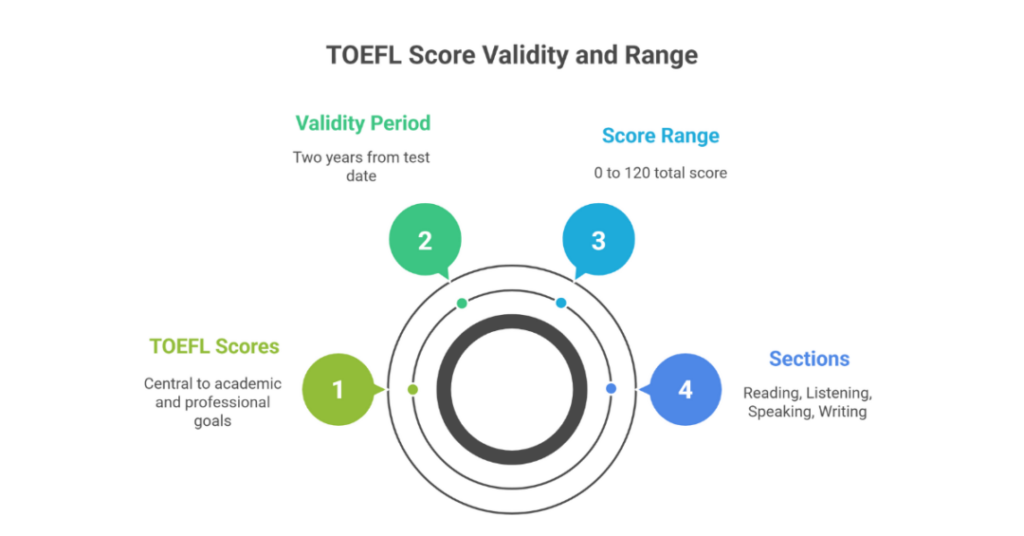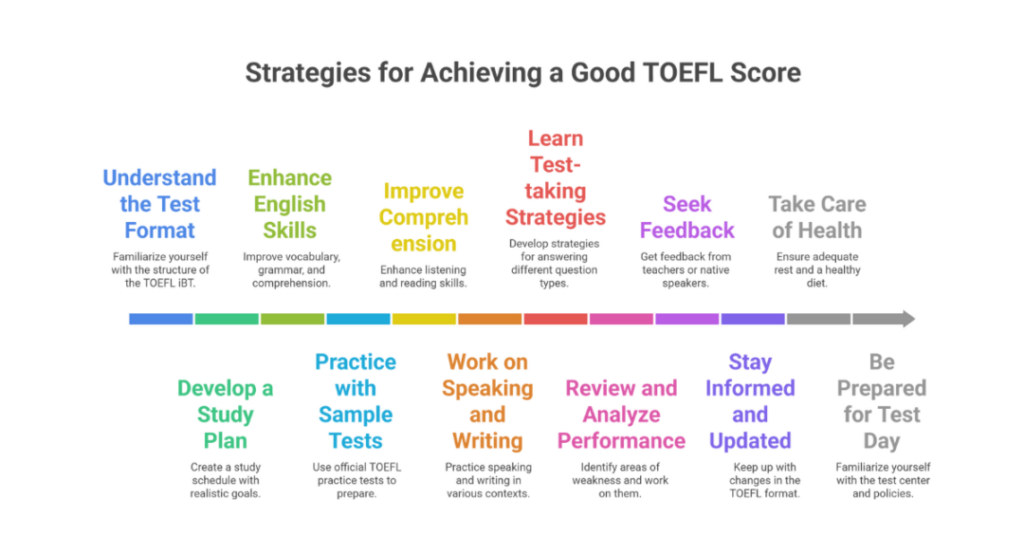22 July 2025
7 minutes read
Do You Get Your TOEFL Scores Immediately? An In-Depth Guide to TOEFL Score Reporting

Key Takeaways
- Do you get your TOEFL scores immediately? Only unofficial Reading and Listening scores are shown right after the test; official scores take 6–10 days.
- TOEFL scores stay valid for two years, so schedule your test to match application timelines.
- Know how to read and send your score report to avoid delays and meet university deadlines.
The Test of English as a Foreign Language (TOEFL) is a critical assessment for non-native English speakers aiming to study or work in English-speaking environments.
A common question among test-takers is: Do you get your TOEFL scores immediately? This comprehensive guide delves into the process of TOEFL scoring, score reporting, and how to efficiently send your results to institutions.
Understanding the TOEFL Scoring System
Scoring well on the TOEFL is crucial for students aiming to study abroad, yet many struggle to decode how the test is graded. Understanding how each section; Reading, Listening, Speaking, and Writing is scored helps you set clear goals and plan your preparation effectively.
When Will You See Your Results?
After completing the TOEFL iBT test, the anticipation for results begins. Official scores are typically available online 6 to 10 days following the test date.
These results can be accessed via the ETS (Educational Testing Service) account. While immediate official scores are not provided, test-takers might get a glimpse of their unofficial Reading and Listening scores immediately after the test. However, these are provisional and should not be considered final.
The Significance of Score Reporting Delays
The delay in score reporting is primarily due to the thorough evaluation process. TOEFL, being an internationally recognized test, ensures accuracy and fairness in scoring.
The Speaking and Writing sections, requiring manual evaluation by multiple examiners, contribute to the delay. This meticulous process ensures the reliability and validity of the scores.
Score Validity and Understanding the Score Range
Score validity and understanding the score range are crucial for planning your study abroad journey. Knowing how long your test scores remain valid and what score range qualifies as competitive helps you avoid expired results and set realistic admission goals for top universities.
How Long Are TOEFL Scores Valid?
TOEFL scores are valid for two years from the test date. This validity period is crucial for test-takers planning to apply to universities or for work permits.

It’s advisable to plan your test date accordingly, ensuring that your scores remain valid throughout the application process of your chosen institutions or organizations.
Deciphering the TOEFL Score Range
Each section of the TOEFL test – Reading, Listening, Speaking, and Writing – is scored out of 30, leading to a total score range of 0 to 120. A higher score typically reflects a better command of the English language.
Understanding the score range is essential for setting realistic goals and for preparations aimed at achieving the desired score.
Navigating Post-Test Processes
Navigating post-test processes can be as important as the test itself. From understanding results and retakes to meeting deadlines for admissions or certifications, knowing what steps to take next ensures you don’t miss crucial opportunities or compromise your goals
Sending Your TOEFL Scores to Institutions
Sending your TOEFL scores to institutions is a crucial step in completing your study abroad application. Universities and colleges won’t review your profile until they receive official scores directly from ETS, and delays can hurt your chances. Knowing how and when to send them ensures your application stays on track.
Choosing Score Recipients
Before or immediately after the test, candidates can select up to four institutions to receive their TOEFL scores at no extra cost. This selection should be made with consideration to the application deadlines and requirements of the chosen institutions.
Additional Score Reports
If you need to send scores to more than four institutions or at a later date, additional score reports can be ordered through the ETS account for a fee. This flexibility allows candidates to apply to more institutions or to send updated scores if they retake the test.
Accessing and Understanding Your TOEFL Score Report
Accessing and understanding your TOEFL score report is essential for tracking your test performance and meeting university requirements.
Knowing how to read your scores helps you plan retakes, improve specific sections, and submit results confidently to your target institutions.
Reading Your TOEFL Score Report
Your TOEFL score report provides a detailed breakdown of your performance in each section. It includes scaled scores and performance feedback, which is instrumental in understanding your strengths and areas needing improvement. This feedback can be particularly useful if you plan to retake the test.
PDF Score Reports and Online Access
In addition to online access through the ETS account, candidates can download PDF versions of their score reports. These PDFs are official documents and can be used for applications where physical copies of score reports are required.
The Implications of Score Reviews and Retakes
Requesting a Score Review
If you believe that your scores for the Speaking or Writing sections do not reflect your performance, you have the option to request a score review. However, this must be done within a specific timeframe after the score release, and it comes with an additional fee.
Deciding to Retake the TOEFL
If your scores do not meet the requirements of your target institutions or if you believe you can perform better, retaking the TOEFL is an option. Understanding the score validity and planning retakes within the two-year validity period is crucial for a strategic approach.
Strategies for Achieving a Good TOEFL Score
Achieving a high score on the TOEFL (Test of English as a Foreign Language) requires a strategic approach, combining thorough preparation with effective test-taking techniques.

Here are key strategies to help you excel in the TOEFL exam:
- Understand the Test Format:
- Familiarize yourself with the structure of the TOEFL iBT, which includes sections on Reading, Listening, Speaking, and Writing.
- Know the types of questions and tasks you will face in each section.
- Develop a Study Plan:
- Create a study schedule that allocates time for each section of the test.
- Set realistic goals and milestones to track your progress.
- Enhance Your English Skills:
- Engage in activities that improve your English, such as reading English newspapers, watching English movies, and speaking with native English speakers.
- Focus on building vocabulary, grammar, and comprehension skills.
- Practice with Sample Tests:
- Use official TOEFL practice tests to get a feel for the actual exam.
- Practice under timed conditions to improve your time management skills.
- Improve Listening and Reading Comprehension:
- Regularly listen to English podcasts, news, and lectures to enhance your listening skills.
- Read a variety of English materials, including academic texts, fiction, and articles, to improve reading comprehension.
- Work on Speaking and Writing Skills:
- Practice speaking English in a variety of contexts, focusing on clarity and fluency.
- Write essays on different topics, paying attention to structure, coherence, and grammar.
- Learn Test-taking Strategies:
- Develop strategies for answering different types of questions, such as skimming and scanning in the reading section or taking brief notes during the listening section.
- Understand how to structure responses in the speaking and writing sections effectively.
- Review and Analyze Your Performance:
- After practicing, review your answers, especially in the speaking and writing sections.
- Identify areas of weakness and work on them diligently.
- Seek Feedback:
- Get feedback on your speaking and writing from teachers or native English speakers.
- Use this feedback to refine your language skills.
- Stay Informed and Updated:
- Keep up with any changes in the TOEFL format or content.
- Join online forums or groups for TOEFL candidates to exchange tips and resources.
- Take Care of Your Health:
- Ensure adequate rest and a healthy diet during your preparation period.
- Practice stress management techniques to stay calm and focused.
- Be Prepared for the Test Day:
- Familiarize yourself with the test center location and policies.
- Arrive early on the test day with all necessary documents and materials.
By following these strategies, you can enhance your English language proficiency and test-taking skills, significantly increasing your chances of achieving a good TOEFL score. Remember, consistent practice and a positive attitude are key to succeeding in the TOEFL exam.
Navigating Score Requirements for Different Institutions
When applying to various institutions, understanding and meeting the TOEFL score requirements is crucial. Here are key points to help you navigate these requirements effectively:
- Research Specific Requirements:
- Each institution and program has its own minimum TOEFL score requirement. Research these requirements well in advance to ensure you meet them.
- University websites and admission offices are reliable sources for this information.
- Consider Geographical Location:
- Institutions in English-speaking countries like the USA, UK, Canada, and Australia often have higher TOEFL score requirements due to the nature of their academic environment.
- Institutions in English-speaking countries like the USA, UK, Canada, and Australia often have higher TOEFL score requirements due to the nature of their academic environment.
- Understand Program Demands:
- Competitive programs such as Medicine and Engineering typically demand higher TOEFL scores. For example, Medicine at University F requires a minimum score of 105.
- Programs focusing on communication, like Social Sciences and Business Administration, may emphasize speaking and writing skills.
- Look for Additional Score Requirements:
- Some programs may have specific requirements for individual TOEFL sections. For instance, Business Administration at University B requires a writing score above 22.
- Some programs may have specific requirements for individual TOEFL sections. For instance, Business Administration at University B requires a writing score above 22.
- Check for Score Validity:
- Ensure that your TOEFL scores will be valid at the time of your application. TOEFL scores are typically valid for two years from the test date.
- Ensure that your TOEFL scores will be valid at the time of your application. TOEFL scores are typically valid for two years from the test date.
- Aim Higher for Scholarships:
- Some institutions, like University A for Engineering, prefer higher TOEFL scores for scholarship eligibility.
- Aiming higher than the minimum requirement can enhance your application.
- Understand Flexibility in Requirements:
- Certain institutions, like Community College E for General Studies, may offer flexibility for lower scores if the candidate has a strong academic record.
- Certain institutions, like Community College E for General Studies, may offer flexibility for lower scores if the candidate has a strong academic record.
- Prepare Accordingly:
- Tailor your TOEFL preparation to meet the specific score requirements of your desired program.
- Focus on improving skills in sections that are particularly emphasized by your target program.
- Stay Updated on Changes:
- Institutions may update their score requirements periodically. Keep checking for the most current information, especially if you are planning to apply in the future.
- Institutions may update their score requirements periodically. Keep checking for the most current information, especially if you are planning to apply in the future.
- Contact Admission Offices for Clarifications:
- If you have any doubts or need specific information about TOEFL score requirements, don’t hesitate to contact the admissions office of the respective institution.
- If you have any doubts or need specific information about TOEFL score requirements, don’t hesitate to contact the admissions office of the respective institution.
- Consider Multiple Options:
- Apply to a range of institutions with varying score requirements to increase your chances of acceptance.
- Apply to a range of institutions with varying score requirements to increase your chances of acceptance.
By thoroughly researching and understanding the TOEFL score requirements of different institutions and programs, you can strategically prepare for the TOEFL test and enhance your chances of gaining admission to your preferred institution.
Conclusion
Understanding the TOEFL scoring system, the timeline for score availability, and the process of sending scores to institutions is vital for any TOEFL test-taker.
With proper preparation and a clear understanding of these processes, achieving and efficiently utilizing your TOEFL scores becomes a more manageable and less daunting task.
But crafting a standout profile takes more than just strong letters, it needs the right strategy. At Ambitio, we don’t just guide; we build your profile to make admissions committees take notice. Want tailored help for your applications? Book your free profile-building session with Ambitio Elite today and let’s make your dream admit a reality.
FAQs
What is the fastest way to get my TOEFL scores?
The quickest way to access your TOEFL scores is through your ETS account, where they are available 6-10 days after the test.
Can I send my TOEFL scores to more than four institutions?
Yes, you can send your TOEFL scores to additional institutions beyond the initial four, but this will incur an extra fee per institution.
What should I do if I’m not satisfied with my TOEFL scores?
If you’re not satisfied with your scores, you can either request a score review for the Speaking and Writing sections or plan to retake the test.
How important are TOEFL scores for university applications?
TOEFL scores are critically important for non-native English speakers applying to English-speaking universities, as they demonstrate proficiency in English.
How can I prepare effectively for the TOEFL?
Effective preparation involves understanding the test format, practicing with sample tests, focusing on weak areas, and developing good time management skills.

You can study at top universities worldwide!
Get expert tips and tricks to get into top universities with a free expert session.
Book Your Free 30-Minute Session Now! Book a call now




























